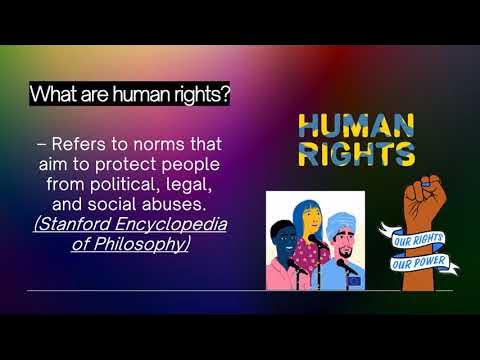Kuliah Pendidikan Kewarganegaraan: Hak Azasi Manusia
Summary
TLDRThis lecture on Human Rights (HAM) in Indonesia delves into the foundational concepts of HAM, highlighting its inherent, universal, and inalienable nature. The speaker explores key historical milestones, legal frameworks, and international human rights instruments, emphasizing their importance in ensuring dignity and justice. The discussion also covers human rights violations in Indonesia's history, the role of national bodies like Komnas HAM, and the need for reconciliation and legal redress. It encourages ongoing education on human rights, using films and case studies to deepen understanding and awareness of the issues at hand.
Takeaways
- 😀 Human rights (HAM) are fundamental, inalienable rights that every human being possesses from birth, grounded in God's gift and natural law.
- 😀 Human rights consist of three main elements: 'Hak' (rights), 'Asasi' (fundamental), and 'Manusia' (human), reflecting the basic and inherent nature of these rights.
- 😀 Human rights are characterized by their 'Kodrat' (natural and divine origin), 'Hakiki' (inherent and unchangeable nature), and 'Universal' applicability across all people.
- 😀 Human rights in Indonesia are protected by several legal frameworks, including the 1945 Constitution and the Human Rights Law No. 39/1999.
- 😀 Globally, key documents such as the Magna Carta (1215), the Declaration of Independence (1789), and the Universal Declaration of Human Rights (1948) have shaped human rights norms.
- 😀 Human rights are indivisible and cannot be transferred, divided, or taken away, ensuring every individual’s dignity and freedom.
- 😀 Indonesia’s commitment to human rights has evolved, with significant progress made post-Reformation through laws like the Ad-Hoc Court Law (2000) and the formation of Komnas HAM.
- 😀 Economic, social, cultural, and civil rights are all vital categories of human rights, covering aspects like education, work, freedom of expression, and legal protection.
- 😀 Human rights violations, such as the 1965 genocide and incidents like the Semanggi and Tanjung Priok events, remain unresolved but are addressed through reforms and reconciliation efforts.
- 😀 The principle of universality in human rights means they apply to everyone regardless of gender, race, religion, or nationality, and no government or individual can infringe upon them.
- 😀 The realization and protection of human rights are crucial in maintaining harmony in society, with ongoing efforts for reconciliation, such as potential amnesty and judicial actions for past violations.
Q & A
What does HAM (Human Rights) refer to?
-HAM refers to the fundamental rights that are inherent in all human beings, granted by God. These rights are universal, inalienable, and cannot be taken away or transferred.
What are the key characteristics of Human Rights (HAM)?
-The key characteristics of HAM include being natural (anugerah Tuhan, or divine gift), inherent to every person, universal (applicable to all humans), indivisible, and inalienable. These rights must be protected and upheld in all circumstances.
What are the main legal instruments related to Human Rights in Indonesia?
-The primary legal instruments for HAM in Indonesia include the 1945 Constitution, Law No. 39 of 1999 on Human Rights, Law No. 26 of 2000 on Human Rights Courts, and various Presidential Decrees and regulations that further define and protect human rights in the country.
What is the Universal Declaration of Human Rights and its significance?
-The Universal Declaration of Human Rights, adopted in 1948, outlines fundamental rights that should be universally protected for all people. It includes rights such as the right to life, liberty, freedom of expression, and protection from discrimination.
How did human rights awareness evolve in Indonesia?
-Human rights awareness in Indonesia grew significantly during the post-reform era, particularly with the establishment of Komnas HAM (National Human Rights Commission) in 1993, the introduction of key legislation like Law No. 39 of 1999, and efforts to address past human rights abuses.
What are the 'Four Freedoms' mentioned by former U.S. President Roosevelt?
-The 'Four Freedoms' outlined by Franklin D. Roosevelt include freedom of speech, freedom of worship, freedom from fear, and freedom from want. These freedoms form the basis of human rights principles and are referenced in global human rights discourse.
What role does the Indonesian government play in protecting human rights?
-The Indonesian government has a responsibility to respect, protect, and fulfill human rights through legislation, enforcement, and ensuring that human rights are integrated into the legal and social frameworks. This includes supporting Komnas HAM and judicial mechanisms for addressing human rights violations.
What is the relationship between human rights and economic, social, and cultural rights?
-Economic, social, and cultural rights are essential components of human rights, ensuring that individuals have access to resources and opportunities for a dignified life, including the right to work, social security, education, and participation in cultural life.
How does the concept of human rights relate to Indonesian law?
-In Indonesia, human rights are codified in the 1945 Constitution and various human rights laws, such as Law No. 39 of 1999. These laws protect individuals' fundamental rights and freedoms, ensuring equal treatment under the law and providing mechanisms for redress in cases of violations.
What is the significance of 'reconciliation' in addressing past human rights abuses in Indonesia?
-Reconciliation is important in Indonesia to heal the wounds of past human rights violations. It involves both legal accountability for those responsible for abuses and forgiveness, aiming to restore unity and ensure that such violations do not recur in the future.
Outlines

This section is available to paid users only. Please upgrade to access this part.
Upgrade NowMindmap

This section is available to paid users only. Please upgrade to access this part.
Upgrade NowKeywords

This section is available to paid users only. Please upgrade to access this part.
Upgrade NowHighlights

This section is available to paid users only. Please upgrade to access this part.
Upgrade NowTranscripts

This section is available to paid users only. Please upgrade to access this part.
Upgrade Now5.0 / 5 (0 votes)





